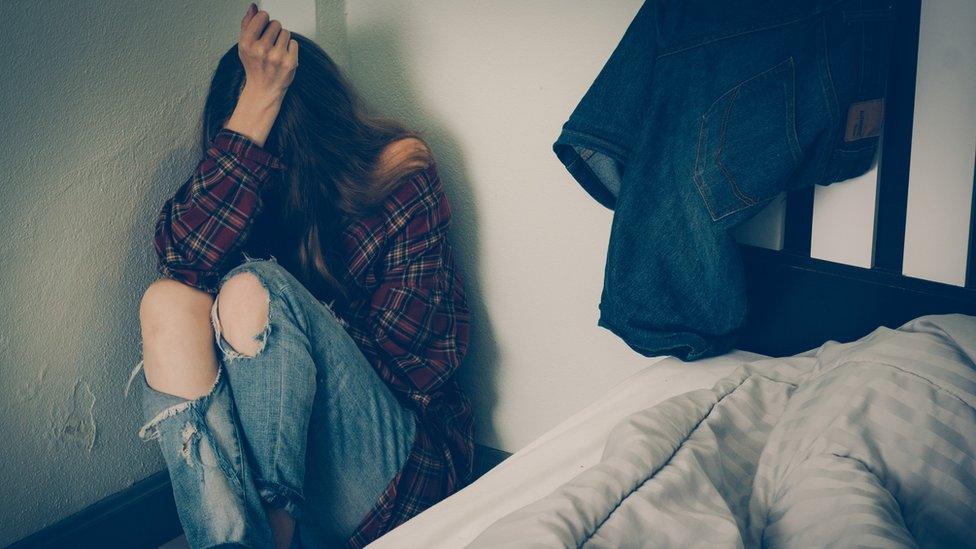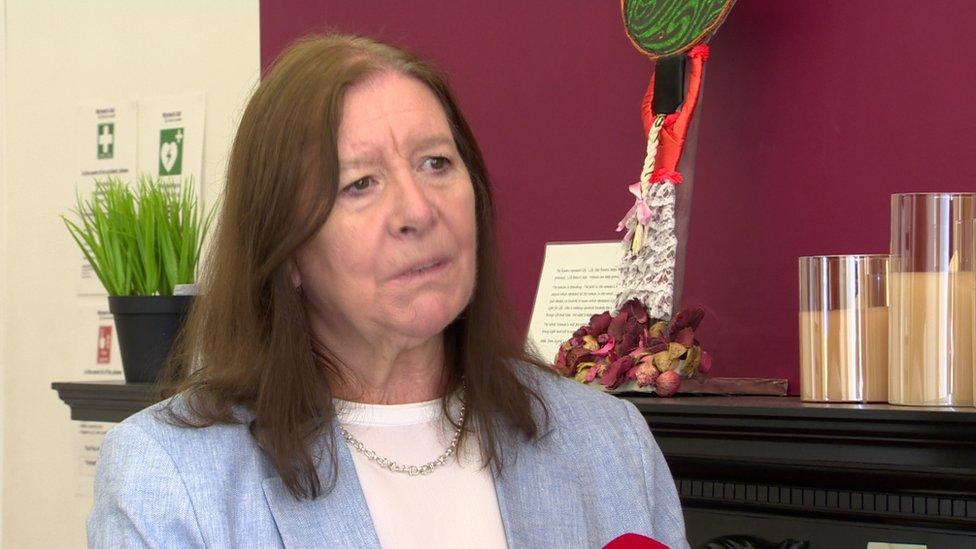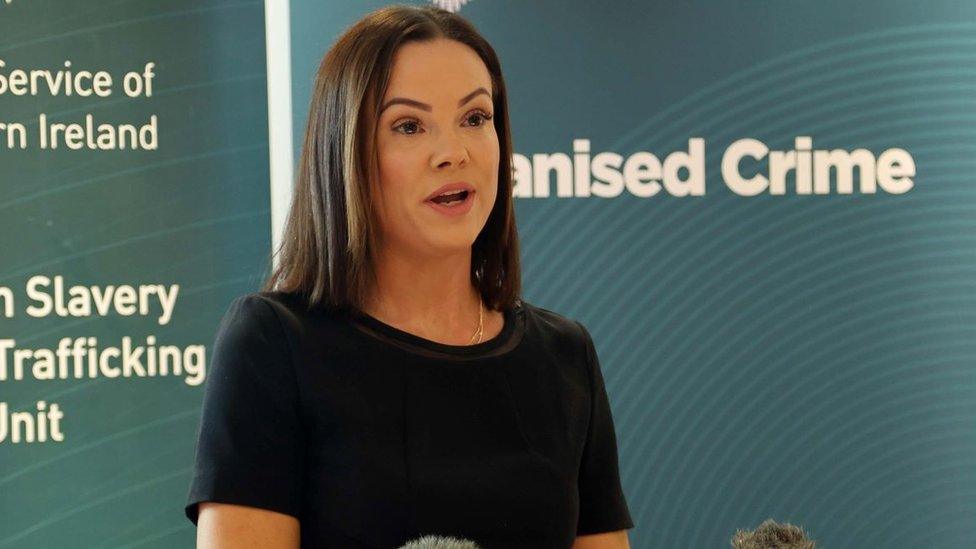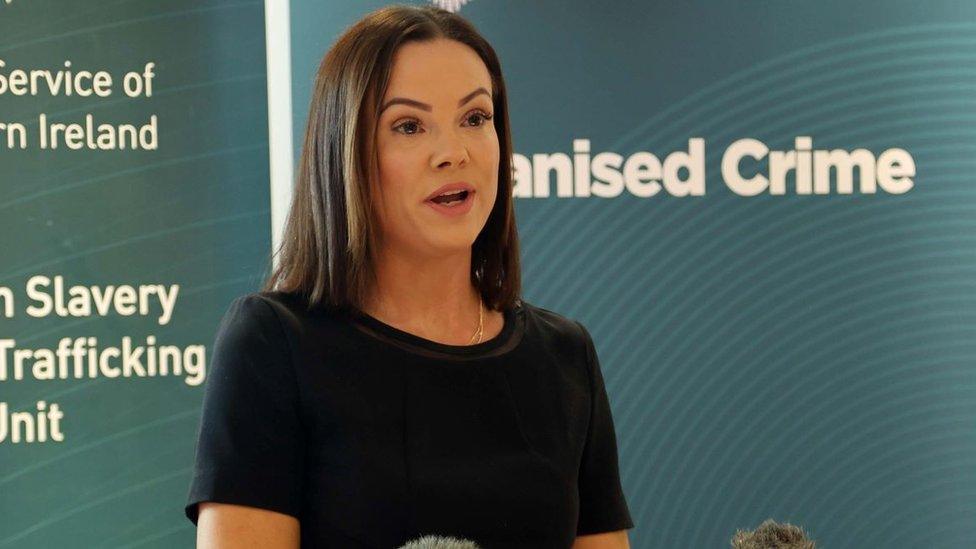Huge increase in human trafficking victims in Northern Ireland, charity says
- Published

Human trafficking is now a big problem in Northern Ireland, a women's aid charity has said.
Six women have been identified as victims of human trafficking after they were "forced into prostitution and exploited", the PSNI has said.
Women's Aid Belfast and Lisburn said it is currently dealing with more than 230 female victims of human trafficking. In 2021 the figure was 47.
The charity last week dealt with a case of organ harvesting.
It is understood the organ harvesting happened in transit prior to the woman arriving in Northern Ireland from another country.
"We have come a long way. Human trafficking wasn't on the radar of any of our minds in Northern Ireland for many years and now people are understanding that it actually happens," Noelle Collins, the area manager of Women's Aid in Belfast and Lisburn told BBC News NI.
"It was something that happened perhaps in the Middle East, but not on the streets of south Belfast.
"Unfortunately now it is a big problem here in Northern Ireland."

Noelle Collins said Women's Aid Belfast and Lisburn is currently dealing with more than 230 female victims of human trafficking
The National Referral Mechanism, external (NRM) is a framework for identifying and referring potential victims of modern slavery and ensuring they receive appropriate support.
Ms Collins said that when her organisation first started working with victims of human trafficking there was a "45-day reflection period for that inquiry to happen", but that could now last as long as 500 days.
"So while women are in the NRM they are actually in limbo because they can't work, they can't move on with their lives - and they are the women that we are supporting," she added.
"This morning we have 234 women with 150 dependent children in the NRM that we are supporting, which is vast numbers.
"Many of them are foreign-national women but there are local women in there as well who have been subject to human trafficking on the island of Ireland.
"The majority of those women would also have applications in for refugee asylum and they are living in hotels.
"There are quite a lot of these women who were professionals in their countries back home - there are women who worked for government, women with PhDs who really need and want to get back to our society because they feel Northern Ireland has rescued them."
Ms Collins said "you can't imagine the trauma these women have been through because of their exploitation".
Most have been victims of sexual exploitation, she added, some of domestic servitude - "and we had our first victim of organ harvesting last week - it was horrendous".
She said the woman had a kidney removed "without her consent and without her knowledge" and is "now in the care of our medical service here".
On Thursday the Police Service of Northern Ireland (PSNI) said they had identified six women as victims of human trafficking after a "significant" investigation conducted with authorities in Romania.
They were investigating a group suspected of trafficking young women for the purpose of sexual exploitation.
Two men, 29 and 36, and a woman aged 35 have been arrested.
They are accused of controlling prostitution for gain, brothel keeping and money laundering.

Det Insp Rachel Miskelly said the women identified had been treated appallingly
On Thursday, the PSNI said the six victims, all aged in their 20s, had been enticed to travel with the false promise of lawful employment in Northern Ireland and had been trafficked through Dublin.
"The grim reality is that, upon arrival, they're forced into prostitution and exploited," Det Insp Rachel Miskelly said.
More victims suspected
Brothels believed to be linked to the group were in the greater Belfast area, as well as Newtownabbey.
However, police said victims were sent to various locations in Northern Ireland for sexual exploitation purposes.
A joint investigation team was set up with Romanian authorities to gather evidence on the suspects and identify potential victims.
Both teams have also been working closely with the National Crime Agency, the Public Prosecution Service, An Garda Síochána (Irish police), Women's Aid and the International Justice Mission.
However, police believe there are still more victims to be found.
Det Insp Miskelly urged members of the public, and human trafficking victims, to contact them with information.
"I assure you that you will be treated with respect and sensitivity - every step of the way," she said.
In March of this year, it was reported that nearly 550 people were potentially trafficked into Northern Ireland last year, according to Home Office statistics.
That was an increase of 50% on 2021, when the figure was 363.
In the past four years, the number of people referred through the national referral mechanism in Northern Ireland increased by 1000%.
- Published27 July 2023
